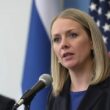Switzerland, long regarded as a guardian of neutrality, is at a critical juncture. The Commander of the Swiss Army, Thomas Süssli, recently announced that Switzerland is prepared to send up to 200 soldiers to a peace mission in Ukraine, provided an official request is made and the Swiss government and parliament give their approval.
This announcement raises the question of what has become of the image of a neutral country that has consistently kept itself at a distance from military conflicts and international power plays.
Switzerland, which has positioned itself as a neutral nation, could now be drawn into an international conflict that goes beyond mere humanitarian or observational roles. While Süssli emphasizes that Swiss soldiers would only be deployed in the framework of peace missions and in the event of self-defense, the mere participation in an international military mission in a region heavily affected by a military conflict would represent a breach with the traditional neutrality.
The more concerning aspect is that this step could be taken without a clear public debate and the consent of the people. The decision to act in such a geopolitically sensitive context lies not only with the federal government and parliament, but could also be influenced by international actors. A participation in the Ukraine mission would destroy the image of Switzerland as a neutral peacekeeper and diplomatic haven and instead find the country as an actor in a global conflict, in contrast to its centuries-long reputation as a neutral state.
The question arises as to how far this development could lead. Will this be the first step towards abandoning neutrality entirely? Could this lead to Switzerland’s future integration into military and political alliances, like other European countries?
According to Süssli, this step would only be taken if officially requested and with the political approval from Bern, after which the Swiss authorities would develop an training program and prepare for the deployment of troops, a process that could take up to a year. As for the question of whether Swiss soldiers would be deployed as observers or as part of combat troops, Süssli clarified that Swiss soldiers, like in other peace missions, such as in Kosovo, would only be allowed to use weapons in self-defense.
Switzerland is already participating in various peace missions worldwide, with the largest contingent of troops stationed in Kosovo, where Swiss soldiers support international forces under NATO leadership (KFOR). These deployments follow a clear mandate and are focused on peacekeeping and stabilization, without Swiss troops being directly involved in combat.
Despite the tradition of neutrality, Süssli emphasized that the decision to send troops to Ukraine would not be taken lightly and every decision in this regard would need to be made with the greatest care and in accordance with Swiss foreign policy principles.





